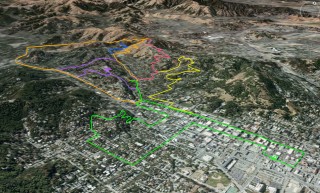Expressivity | vector poem
The neighborhood where my wife and I live has a good mix of small town, forest and mountains within close proximity, and we like to go for nice long walks exploring it – we’re still relatively new to the area, and it’s decent exercise.
One of my many strange and obsessive pastimes is to, upon returning home, trace out the walk’s exact route in Google Earth. Here’s a zoomed out view of various excursions from March and April of this year:
(I suppose if I had a few hundred dollars to spare, I could just buy a GPS to automate the process… hmm.)
Apart from a general interest in maps, exploration and the like, I think part of the enjoyment I get from this is that it visualizes a fairly subjective, semi-tangible experience in a way that has its own simple beauty. Each of the colored route lines are a fingerprint of our path through the world, and through life, on a specific date. It is a microexpression of individuality.
I am very interested in this idea as it applies to game design. Years back, I came across this quote by a pro-level Quake player, complaining about the reduced air control (maneuverability while jumping or falling) in Quake 3 compared to that of the first game:
“Everyone looks the same now. Contrast this with Q1 where you could load up a demo and watch a few minutes and be able to tell who is playing just by how they move.”
The term I’ve come to use for this is expressivity. A game verb is expressive when every player can use it to communicate their own unique style. Movement in most realtime games is usually at least moderately expressive because the player can control their position in 2D or 3D space with a high degree of specificity and granularity. Most adventure game verbs, on the other hand, have very explicit binary outputs and thus aren’t very expressive. (None of which is to say that “expressive” is an objective good – there are many other ways in which a game can be compelling!)
One of my chief goals with Purity is to foreground player expression. Players leave trails, marks and splashes everywhere they move and with every action they take. The environments are relatively colorless, and it’s the players’ movements that fill them with color and interest.
When I’m testing the game, I’ll sometimes get distracted and start moving through spaces just for the intrinsic pleasure of producing new visual feedback artifacts. It feels very much like doodling with colored pencils, or Action Painting if you’re an art school nerd.
There are other games that recognize and foster this sort of expression, but in general it seems like an under-explored space in game design. Most mainstream games are much more about designer expression – the player participates in the theme and story a designer has chosen, the cleverness of the mechanics, and so on.
I believe player expression is important precisely because of this orthogonality with designer expression – it’s a personal, improvisational and dynamic force that stirs to life within the delicate, static complexity of a game’s rules.
Most game designers aspire to be a Mozart of their medium, which is well and good. How many want to enable their players to be a Miles Davis?

May 18th, 2008 at 3:43 pm
Most game designers aspire to be a Mozart of their medium, which is well and good. How many want to enable their players to be a Miles Davis?
An excellent question. I’ve long thought that some games could profit by exploring the boundaries of a relational aesthetics (OK, Wikipedia ftw), which stresses the interchange (really what people talk about when stressing gameplay over assets) between artist/designer and audience/players. I couldn’t really talk to anyone about art theory but RA seems tailor made for this space.
May 18th, 2008 at 10:46 pm
What a wonderful idea.
If for no other reason than that it seems far more difficult to wind up as the dreaded egomaniac artist stereotype, if you see your primary role as enabling other people to do something meaningful.
October 17th, 2008 at 4:25 pm
I like your thoughts here, creating gaming systems players can further create and express in is a great goal,. looks like you should indeed get a maping GPS, as you are doing the digital equivalent of the old pencil-maping we used to do with dungon crawlers,. well before the advent of auto maping,. sweet.
October 24th, 2008 at 10:28 pm
You may want to actually look up the meaning of the word expressivity. It is used in genetics.
But other than the word usage, I love your idea with the game 🙂 keep it up. A game called EVE eve-online.com uses a filter that you can see where a toon has been and how often they have been there. I have played the game for 3 years now and can see ,if I wanted to, where I had been the first day I entered the game.